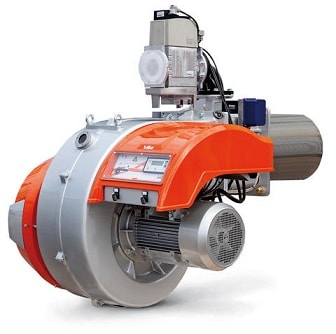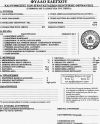Introduction to condensing boilers
Introduction to condensing boilers
What is a Condensing boiler?
A condensing boiler; also known as a condensing hot water heater, is a type of boiler that is much more efficient than the traditional type appliance. Extra efficiency is achieved by extracting more energy out of the flue gas as compared to that of a conventional boiler and using this energy to pre-heat the return water flowing into the boiler. To understand how this process works, we have to consider some basic chemistry.
When gas burns, it combines with oxygen to produce carbon dioxide and water and some other by-products. For instance, methane gas (natural gas).
CH4 + 2O2 → CO2 + 2H2O + ∆E
Where ΔE is the energy released in combustion. The size of ΔE depends on the final state of the carbon dioxide and water. The cooler they are, the more spare energy there is. For the water, this is particularly important because if the water is vapour, then it carries a lot more energy than if it is liquid.
So if, on leaving a boiler, the flue gases are cool and the water is liquid, then the amount of energy ΔE that we can use is going to be larger. In a condensing boiler, the water is condensed inside the boiler so more energy can be extracted; in a conventional boiler, the water escapes as vapour and the energy is lost.
Lower Operating Temperatures.
To be able to condense the water vapour from the flue gas, the condensing boiler should operate using a lower entering water temperature than a conventional boiler. This is because the condensing process occurs at around 54°C.
However, even when running at traditional, non-condensing temperatures of 80/60 a condensing boiler typically offers 4-5% better efficiency than a non-condensing boiler due to the superior heat exchanger and burner control in a condensing boiler.
A conventional boiler will typically have a minimum entering water temperature of around 60°C, with an exit temperature of 80°C, and will not have the heat exchange elements in place to achieve the extra heat recovery in any case. Indeed, if condensing does occur in a conventional boiler it’s a bad thing – because the condensate does include acidic by products that will corrode the inside of the boiler and ultimately cause it to fail. Condensing boilers have additional heat exchange elements and are manufactured of the right materials to withstand corrosive condensates.
How efficient is a condensing boiler?
The efficiency of a boiler is measured by the ratio of energy output to energy input. To complicate matters, there are two conventions for measuring the energy content of gas:
Gross calorific value: this is the energy released in combustion assuming that the water in the flue is liquid
Net calorific value: this is the energy released in combustion assuming that the water in the flue is vapour.
The correct figure to use when considering a condensing appliance is always the gross calorific value, which is the larger value. However, some promotional literature for conventional boilers will use the net calorific value, because this makes their conventional boiler look more efficient.
Using Gross calorific values, conventional boilers are typically around 80-83% efficient at full load. By contrast, a condensing boiler using the same basis is around 95% efficient at full load.
Using Net calorific values, these figures both increase by about 10%, so that the condensing boiler has an apparent efficiency of 103% – because it is extracting more heat from the flue gas that the net calorific value recognises.
So the immediate benefit of a condensing boiler is an improvement in efficiency of at least 10-15%.
Copyright © KtirioService 2006-2026. All Right Reserved.
Designed & developed by webgift.



